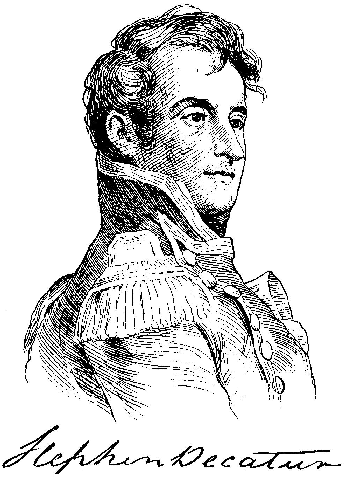


COMMODORE JOHN BARRY MEMORIAL
Boston Common, along Tremont Street
(Next to Visitors Information Center)

Battle of Trenton

Battle of Princeton

The USS United States versus HMS Macedonian--October 25, 1812
As Americans were still celebrating the victory of the Constitution over the Guerrière, Captain Stephen Decatur brought news of the defeat of yet another British frigate. On October 25, 1812, while the United States cruised five hundred miles west of the Canary Islands, Decatur sighted the Macedonian, under the command of Captain John Carden. The two ships engaged one another, and Decatur proved himself a man of vigorous action. British survivors reported that the United States fired her guns at such a high rate that the smoke caused the crew of the Macedonian to believe she had caught fire. But such was not the case, and after only ninety minutes of pounding, the Macedonian struck her colors and became a prize of the United States. Decatur, again the hero, arrived in New York with the Macedonian flying the American flag.

On the 25th, soon after daylight, in latitude 29° north, longitude 29°30' west, this American 44 fell in with, on her weather beam, the British 38-gun frigate Macedonian, Captain John Carden. The latter, then steering north-west-by-west, with the wind to the southward, immediately bore-up towards the United-States; whose force and national character (her colours being hoisted) were soon made out. At nine o'clock, finding that the British frigate was bearing down to the attack in a heedless and confident manner, the United-States opened a fire from her long 24's; almost every shot of which struck either the hull or masts of the Macedonian. As the latter closed and hauled-up to fire her broadside, the American frigate bore-way a little, to retain the advantage of her superior skill in gunnery. Thus was the action maintained until nearly ten o'clock: by which time all the carronades on the Macedonian'sengaged side had been disabled, and much other damage and a very serious loss incurred; while the United-States was comparatively uninjured.
Satisfied now, that her opponent was more than half beaten, and that there was little danger in closing with her, the United-States backed her main topsail, and, coming to the wind, opened a rapid and most destructive fire from the whole of her broadside; receiving in return the main-deck fire alone of the Macedonian, and that too ill-directed to be of much effect.
By the time the action, from its commencement, had lasted full two hours, the Macedonian had had her mizen-mast shot away by the board and her fore and main topmasts by the caps, her main yard cut to pieces, lower masts badly wounded, rigging of every sort destroyed, a small portion only of the fore-sail left to the yard, two guns on the main deck, and all on the quarter-deck and forecastle but two, disabled: she had also received upwards of a hundred shots in the hull, several of them between wind and water; had all her boats, except the jolly-boat towing astern, destroyed, and a great portion of her crew killed and wounded.
While the British frigate lay in this defenceless condition, the American, in a comparatively perfect state, having shot ahead, was about to place herself in a raking position on the former's bow. No alternative therefore remained; and at a few minutes past eleven the Macedonian hauled down her colours.


The Frigate Constellation under sail for the last time 1893
The Constellation, a 36 gun frigate of 1,265 tons, was launched at Baltimore, Md., September 7, 1797, the year in which the frigate United States and Constitution were launched. She is still in the service, and is now the station training ship of the Naval Training Station at Newport, R.I.
I was on Constellation in 1970 in Boston. It has remained afloat over two centuries while Ted Kennedy sank his Oldsmobile the first year.



His son, Stephen Decatur, naval officer, born in Sinnepuxent, Maryland, 5 January 1779; died near Bladensburg, Maryland, 22 March, 1820. He made a voyage with his father in 1787. At the age of seventeen he was employed by Messrs. Gurney and Smith, of Philadelphia (who were agents for the navy), and went to New Jersey to superintend the getting out of the keel pieces for the frigate "United States," m which ship he was launched, and which he successfully commanded in the war of 1812'5. Through the aid of Commander Barry, he obtained a warrant as midshipman, dated 30 April, 1798, and was placed on board the frigate " United States." He was at that time nineteen years of age, well informed" for his age, chivalrous in temper, courteous in his deportment, and adding grace of manner to an attractive person. While attached to the frigate "United States" under Com. Barry, Decatur cruised in the West Indies, capturing several French privateers that were preying upon American Commerce. He labored hard to make himself master of his profession. On one occasion the " United States" chased the French privateer "L'Amour de la Patrie," of six guns, which vessel, in attempting to escape, received a twenty-four pound shot at her waterline from the "United States." She at once shortened sail and surrendered, and Decatur was sent in a boat to take possession. When he got alongside, "L'Amour de la Pattie" was sinking fast, and the crew, stripped of their clothing, were assembled at the side, begging to be taken into the boat. As it was impossible to take on board sixty men, Decatur ordered the French captain to put his helm up and run down to the frigate as the only chance of saving the crew. This was done, and though the vessel sank when within fifty yards of the " United States," the crew was saved to a man.